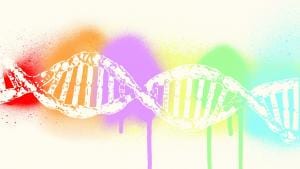
New scientific discoveries mean that parents can do some selection regarding the sexual orientation of their children. They can determine a little bit about the probability their child will be homosexual and abort if they don’t like those odds. It seems that sexual orientation has certain genetic factors but is not determined. I think this creates a conundrum for many who support abortion and in-vitro fertilization, but also think discriminating against homosexuals is wrong. Aborting people because they are more likely to be homosexuals is extreme discrimination. I will list the science, a bit of the Chinese and American cultural reactions, and then note a Catholic response.
Discovering the Homosexual Gene
The Genetic Literacy Project reported:
In October 2018, geneticist Andrea Ganna and his team at the Broad Institute reported that their review of markers across the entire genome of more than 493,000 test participants identified 4 genome-wide significant loci for homosexual behavior, with many more loci identified for partner count (meaning lifetime number of sexual partners) in heterosexuals. These results led researchers to estimate that 8-20% of variation in non-heterosexual behavior could be attributed to common genetic variants (those most likely to be detected through GWAS) found in this study. Some these genes display curious overlap with others that affect biological processes such as smell and hormone production, hinting at complex cross-genome relationships between sexual preference and other phenotypes. Previous twin and family studies had already suggested that about 40 percent of our sexual orientation is genetically heritable.
The significance of these results isn’t their confirmation of a genetically heritable component to homosexuality, but rather their identification of some of the specific gene variants involved. Scientists need to know which variants, or SNPs (single-nucleotide polymorphisms) are associated with which phenotypic traits to employ such technologies as PGD (preimplantation genetic diagnosis) and gene editing to alter the genetic makeup of future children. Identifying the SNPs associated with homosexual behavior means that manipulating the genetics of sexual orientation could one day become possible.
Secular Response in West & East
The reaction here is vastly different in the West and the East. In the USA, testing to eliminate homosexual babies is unlikely to take hold but this will likely become a standard part of pre-implantation diagnosis done in IVF cases. The Genetic Literacy Project notes how this is received in the West:
In the United States, the political and party divisions that separate the conservative-religious right from the social-justice left do not prevent them from agreeing on the issue of gene-editing technologies, albeit for very different reasons. Typically, conservatives are afraid of playing God, while liberals are more focused on worsening inequality or harming vulnerable minority groups.
The article goes on to note how homosexuality is no longer stigmatized in North America or Europe.
GLP also notes the attitude in China, which are quite different
With no law prohibiting selection against or for specific sexual preferences yet in place, it remains possible that prospective parents may one day be able to choose or alter a future child’s sexual preferences.
[One] place this could have a significant impact is China, where heavy government investment under the current 5-year plan and low barriers to entry have produced a flourishing biotechnology industry. China is already home to more than 10 genome-sequencing companies, one of which, the Beijing Genomics Institute, is the world’s largest. China is seen as a future site for the adoption of cutting-edge gene therapy techniques, even at a time when deliberation over important ethical qualms slows progress in many other countries. An example can be found in the palpable enthusiasm shown towards gene editing by Chinese firms, with one company already emphasizing its vision to “make human beings more beautiful and healthier” using these technologies.
With strong growth in preimplantation genetic diagnosis procedures and no laws directly prohibiting selection of sexual orientation, it’s possible that Chinese parents could soon begin deciding their child’s likely sexual preferences. The implications of this lie deep within the cultural context, as here homosexuality was banned for most of the 20th century. After legalization in 1997, it was finally removed from the official list of mental illnesses in 2001. Still, many taboos against homosexuals remain, and the status of LGBT culture is semi-underground. […]
Unlike in American culture where fears of “eugenics” and “an elite genetic class” still linger after experiences from the first half of the 20th century, PGD [Pre-Implantation Diagnosis] in China has little stigma attached. The practice is being widely adopted across the country, and this continues to accelerate.
Catholic Response
First of all, abortion is always wrong. There is no moral reason to directly kill an innocent baby in the womb or tiny zygote before implantation. We were all zygotes.
Second, using abortion for discrimination adds a layer of nastiness. This is why the Church has been doubly against sex-selective abortions. The catechism speaks out about discriminating against persons who have homosexual tendencies in 2358:
They [men and women who have deep-seated homosexual tendencies] must be accepted with respect, compassion, and sensitivity. Every sign of unjust discrimination in their regard should be avoided. These persons are called to fulfill God’s will in their lives and, if they are Christians, to unite to the sacrifice of the Lord’s Cross the difficulties they may encounter from their condition.
The latter part of that reminds us to call these people to live Christian chastity. It is important to note that all humans are genetically predisposed to certain sins more than others and this varies per person. Some are more prone to anger or gluttony. We should not use this either to consider homosexuality different or use a genetic predisposition to change the moral code.
We Catholic should speak out about the intrinsic discrimination in any form of PGD as we should respect the humanity of each human conceived.
Conclusion
Hopefully, this never comes to the USA or Canada. Hopefully, it helps to humanize the unborn so people realize that an unborn baby is a person. If we will avoid this for homosexuality, why not also avoid it for other issues like Down’s Syndrome?
Note: Please support me via Patreon so I can write more on the Catholic approach to genetic bioethics. If you can’t give monthly, a one-time Christmas gift would be appreciated.












